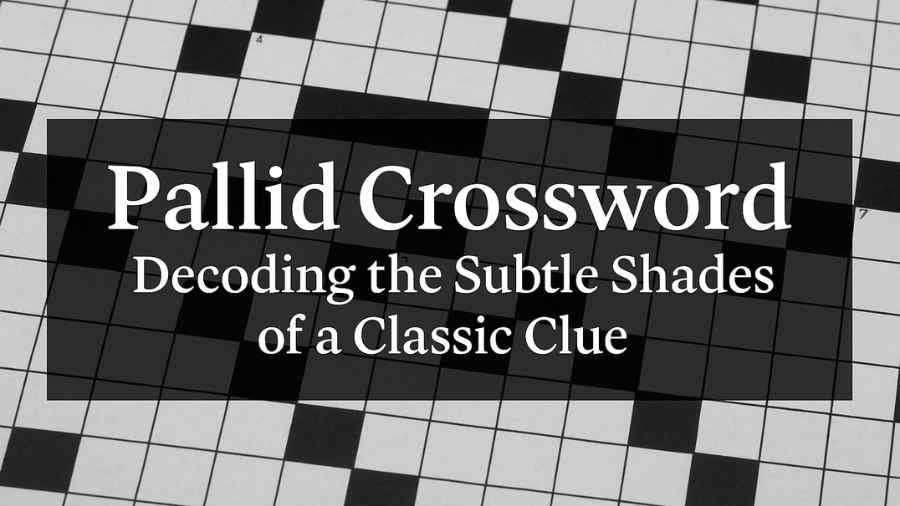Pallid Crossword: Decoding the Subtle Shades of a Classic Clue

The phrase pallid crossword frequently appears in puzzle-solving discussions and online searches because “pallid” is one of those elegant yet tricky adjectives often used by crossword setters to test a solver’s vocabulary. It is not merely about colour or complexion—it carries a sense of weakness, lifelessness, or lack of vitality. Understanding its layered meaning and the range of possible answers is vital for anyone who wants to master crosswords, whether they are a beginner or a seasoned solver.
Understanding the Word “Pallid”
“Pallid” is an adjective derived from the Latin word pallidus, meaning pale. In English, it typically describes something that lacks colour, brightness, or energy. You might describe a person’s face as pallid when they are ill or frightened, or a painting as pallid if it looks washed out and uninspired.
In literature, the term evokes a mood of weakness or emotional emptiness. When a novelist says, “Her face was pallid under the moonlight,” the imagery points not just to paleness, but also fragility. Crossword compilers rely on this dual sense—physical and emotional—to create layered clues that force solvers to think beyond the obvious.
Common Meanings in Crossword Context
In crossword puzzles, every clue is designed to test both definition and wordplay skills. “Pallid” can stand alone as a straightforward clue meaning “pale,” but it can also be part of a longer, more cryptic construction. Common meanings associated with “pallid” include:
Pale or lacking colour
Sickly or unhealthy-looking
Dull, lifeless, or lacking intensity
Weak or feeble in appearance
Because crosswords often restrict you by letter count, you’ll need to find synonyms that match the meaning and fit the available spaces.
Typical Answers for “Pallid Crossword”
Let’s break down the most frequent answers according to word length.
Three-letter answers:
WAN – By far the most common. It means pale or faint, and it is short enough to fit in tight spaces.
Four-letter answers:
PALE – The most direct synonym for pallid, often used in simpler puzzles.
ASHY – Suggests a greyish pallor, like ash-coloured skin.
Five-letter answers:
ASHEN – A very common answer meaning pale, grey-faced, or ghostly.
PASTY – Describes a person’s face as pale and unhealthy.
WAXEN – Refers to a wax-like paleness, often used in poetic clues.
Six-letter answers:
SALLOW – Indicates a yellowish, sickly tone.
ANEMIC – A medical term meaning lacking in red blood cells, hence pale and weak.
SICKLY – Broadly means unhealthy or weak-looking.
Longer answers (seven or more letters):
ANAEMIC – The British spelling of anemic, used in UK crosswords.
BLANCHED – Means turned white or pale, as if drained of colour.
BLEACHED – Suggests a faded or drained appearance.
CADAVEROUS – Meaning corpse-like in pallor.
These answers cover the full spectrum of what crossword setters use to challenge solvers.
How to Identify the Right Answer
When “pallid” appears in your crossword, consider these steps:
Count the letters. If your grid has three spaces, “WAN” will almost always fit.
Check the intersecting clues. The crossing letters help confirm whether it’s “ASHEN,” “PALE,” or “WAXEN.”
Look for modifiers in the clue. If the clue says “pallid and sickly,” then “SALLOW” might be the right choice. If it says “pallid like wax,” then “WAXEN” is ideal.
Consider the puzzle style. American puzzles might prefer “ANEMIC,” while British ones will use “ANAEMIC.”
Analyse the tone. A more literary or cryptic puzzle might choose “CADAVEROUS” or “BLANCHED” for stylistic richness.
The Nuance of Usage
Not all synonyms for “pallid” mean exactly the same thing. Understanding the differences between them can make you a sharper crossword solver.
Pale vs Ashen: “Pale” is neutral, while “ashen” implies greyish or deathly.
Sallow vs Pasty: “Sallow” is yellowish, often implying illness; “pasty” is white and dough-like.
Anemic vs Wan: “Anemic” suggests medical weakness; “wan” can refer to both faint colour and low vitality.
Waxen vs Bleached: “Waxen” has a smoother, fixed quality, whereas “bleached” implies something that was once colourful but has been drained.
Crossword setters play on these fine distinctions to make puzzles both challenging and satisfying.
Historical and Literary Connections
The word “pallid” has appeared in English literature for centuries. Poets of the Romantic era frequently used it to evoke images of sickness, death, or spiritual fragility. Writers like Edgar Allan Poe, Mary Shelley, and Emily Brontë used “pallid” to describe ghostly faces or moonlit scenes.
This literary history gives crossword creators a wide range of imagery to draw from. A clue like “pallid poet” might point not to a colour but to a reference—perhaps a word like “WAN” used metaphorically to describe weakness or sadness.
Why Crossword Setters Love “Pallid”
Crossword compilers choose words that are flexible in meaning and pleasing in sound. “Pallid” meets both criteria. It’s short, elegant, and layered with meaning. It can be used in simple puzzles for “pale,” but in cryptic crosswords, it can appear in complex constructions. For example:
Clue: “Pallid man consumed by fear (5)” → “Ashen” (hidden word: man consumed by fea shen).
Clue: “Weak and pallid, a nobleman perhaps (3)” → “Wan” (sounds like “one,” hinting at nobility).
These creative uses make “pallid” a staple clue in both beginner and expert-level crosswords.
Practical Tips for Solvers
Memorise key synonyms: Keep a mental list of common answers for “pallid.”
Understand tone: Decide whether the clue feels medical, poetic, or literal.
Watch for hidden indicators: In cryptic crosswords, “pallid” might not be the definition but part of a wordplay pattern.
Cross-reference your answers: Always confirm your solution with other clues.
Stay aware of regional spellings: “Anemic” and “Anaemic” can both appear depending on the crossword’s origin.
The Broader Significance of the Word
In a metaphorical sense, “pallid” reflects any lack of vibrancy—whether in art, conversation, or life. Crossword enthusiasts appreciate words like this because they challenge not only vocabulary but perception. A “pallid crossword” can also symbolise a puzzle that lacks flair or imagination, although in most cases, it simply refers to the clue “pallid” itself.
Example Scenarios
Short daily crossword:
Clue – “Pallid (3)” → Answer: WANMedium puzzle:
Clue – “Pallid face (5)” → Answer: ASHENChallenging weekend cryptic:
Clue – “Pallid nobleman’s complexion (7)” → Answer: ANAEMICPoetic-themed crossword:
Clue – “Corpse-like pallid look (10)” → Answer: CADAVEROUS
These examples show how “pallid” works across different puzzle levels.
Expanding Your Vocabulary
To master crosswords, it helps to understand root families of words related to “pallid.” Terms like pale, pallor, appall, and pallorless share the same root meaning of fading or lacking colour. Knowing these connections can help you decode future clues with similar themes.
You might encounter related clues such as:
“Lacking colour”
“Without vibrancy”
“Sickly in tone”
“Colourless face”
All of these could be subtle rephrasing of “pallid.”
Why “Pallid Crossword” Ranks High in Searches
Many crossword enthusiasts look up “pallid crossword” because it combines two popular search types—vocabulary meaning and puzzle-solving. Articles with this keyword perform well in search engines due to the combination of dictionary interest and crossword popularity. As a result, the topic remains evergreen for both learners and puzzle enthusiasts alike.
Conclusion
The clue “pallid crossword” captures more than just a test of vocabulary—it represents the delicate interplay between language, culture, and logic that makes crosswords so enduringly popular. Understanding “pallid” means grasping both its literal and figurative dimensions: a word that signifies paleness, weakness, and sometimes quiet beauty.
Next time you encounter it in your crossword grid, you’ll know that “pallid” can open doors to answers like wan, ashen, sallow, anaemic, and cadaverous. Each one reflects a slightly different shade of meaning, enriching not only your solving skill but also your appreciation of English itself.



